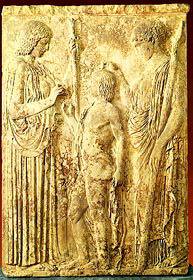Demeter

Level I Final Project
By Phyllis
Demeter (Roman: Ceres) is Mother Nature; goddess of the harvest, fertility
and she is specifically associated with wheat. The following information
came from various sources on the Internet; links are included at the end
of the article.
Demeter was said to have a gentle character, but as with most mothers, she
was also fierce in the protection of her daughter, Persephone. Greek mythology
says that Hades, king of the Underworld, fell in love with Persephone, and
went to Zeus for permission to marry her. (Zeus and Demeter were brother
and sister, -- offspring of Coronus and Rhea – and also lovers. Persephone
was their daughter). Zeus, knowing that Demeter would not wish her daughter
married to Hades, told Hades he neither gave nor withheld his consent. Hades
took this as enough of a sanction from his brother Zeus to seize Persephone.
As Persephone was picking flowers near Eleusis, (some accounts say Demeter
was with her) the earth opened, and Hades in his chariot drawn by black horses
carried Persephone to Tartarus. Demeter searched for her daughter, until
Triptolemus, who had seen the abduction, told Demeter what had happened.
Demeter became so angry, that instead of returning to Olympus, she wandered
about the earth forbidding any plants to yield fruit. Her wandering and mourning
continued until the human race approached extinction.
Since the earth was barren and no sacrifices could be given to the gods,
Zeus sent Hermes with a message to Hades, “Return Persephone, or we are all
undone!” and another message to Demeter, “You may have your daughter back,
if she has not tasted the food of the dead.” Persephone had not eaten anything
since the abduction. Hades told Persephone, “You seem unhappy here, and your
mother cries for you. So, I have decided to send you home.”
 Just as she was setting off for Eleusis in Hermes’ chariot, one of Hades’
gardeners told Hades he had seen Persephone pick a pomegranate and eat seven
seeds. Hades then he knew she had tasted the food of the dead and must eventually
return to Tartarus.
Just as she was setting off for Eleusis in Hermes’ chariot, one of Hades’
gardeners told Hades he had seen Persephone pick a pomegranate and eat seven
seeds. Hades then he knew she had tasted the food of the dead and must eventually
return to Tartarus.
The reunion of Demeter and Persephone at Eleusis was undoubtedly a happy
one, however when Demeter learned Persephone had eaten the pomegranate seeds,
she swore that she would never return to Olympus, nor remove the curse from
the land. But Zeus intervened – settling the matter by ruling that Persephone
should spend three months of each year with Hades, as Queen of Tartarus,
and the remaining nine with Demeter.
Demeter then partially lifted the curse; hence we have three months of winter.
To keep mankind from starving during the winter Demeter supplied Triptolemus
with seed corn, a plough, and a chariot drawn by snakes and sent him all
over the world to teach t he art of agriculture. Triptolemus became King
of Eleusis.
The worship of Demeter at Eleusis became one of the most important cults
in Greece. Festivals in honor of the goddess were attended by rites so secret
that the penalty for initiates who betrayed the secrets was death. The ceremonies,
the Eleusian mysteries, were held twice a year, with the ceremonies in September
having more importance than the ones in March. In September candidates were
initiated. Initiation was open to all, Greeks and barbarians, freemen and
slaves, on the condition that they had not committed the sin of murder. The
ceremony lasted several days from first purification to initiation night.
The hereditary priest, whose families were as old as the sanctuary, led the
initiates through the ceremony to the darkened center room of the sanctuary,
which was suddenly illuminated to reveal some secret and sacred object. Eleusinism
brought its followers a hope of survival after death that probably was accompanied
by moral obligations.
Demeter, Waiting
This is a poem by Rita Dove, U.S. Poet Laureate and Consultant in Poetry at the Library of Congress. (March 1995)

No. Who can bear it? Only someone who hates herself, who believes to pull
a hand back from a daughter’s cheek is to put love into her pocket – like
one of those ashen Christian philosophers, or a war-bound soldier.
She is gone again and I will not bear it, I will drag my grief though a winter
of my own making, refuse any meadow that recycles itself into hope. Shit
on the cicadas, dry meteor flash, finicky butterflies. I will wail and thrash
until the whole goddamned golden panorama freezes over. Then I will sit down
and wait for her. Yes.
Pomegranate Chicken

So much of my time is spent in the kitchen. It seems to be my most comfortable
room in the house. So when I came across this recipe on the ‘net, I thought
it would be a great recipe to try out and also to include here.
Ingredients
2-4 boneless chicken breasts
juice of 2 pomegranates
4 Tbsp. flour
1/2 tsp. salt
1/4 tsp. pepper
1 onion, chopped
2 cups chicken broth
pomegranate seeds
butter or margarine
grapes (optional)
Soak chicken pieces in pomegranate juice for about 45 minutes. Combine
flour, salt, and pepper. Coat the chicken pieces in this mixture.
Keep the pomegranate juice ready on the side.
Sauté the onion in butter until clear, and then add the chicken until
browned. Add the pomegranate juice and broth and simmer for 25 minutes.
Add the pomegranate seeds and grapes just before serving.
Information from Mabon, Celebrating The Autumn Equinox
By Kristin Madden
Sources:
http://web.uvic.ca/grs/bowman/myth/gods/demeter_t.html
http://jcccnet.johnco.cc.ks.us/~jjackson/deme.html
http://waltm.net/demeter.htm
http://www.loggia.com/myth/demeter.html
http://www.messagenet.com/myths/bios/demeter.html
Pictured is “The Return of Persephone” by Frederic Leighton
Pictured is a large votive relief (c.430 BC) found at Eleusis. It is now
in the Archeological Museum in Athens. Persephone is on the right, holding
a torch and Demeter is on the left. She is offering wheat to Triptolemos.
All Material The Intellectual Property of Phyllis
Copyright 2003
Home


 Just as she was setting off for Eleusis in Hermes’ chariot, one of Hades’
gardeners told Hades he had seen Persephone pick a pomegranate and eat seven
seeds. Hades then he knew she had tasted the food of the dead and must eventually
return to Tartarus.
Just as she was setting off for Eleusis in Hermes’ chariot, one of Hades’
gardeners told Hades he had seen Persephone pick a pomegranate and eat seven
seeds. Hades then he knew she had tasted the food of the dead and must eventually
return to Tartarus. 